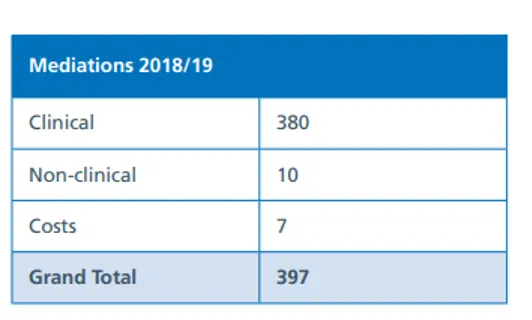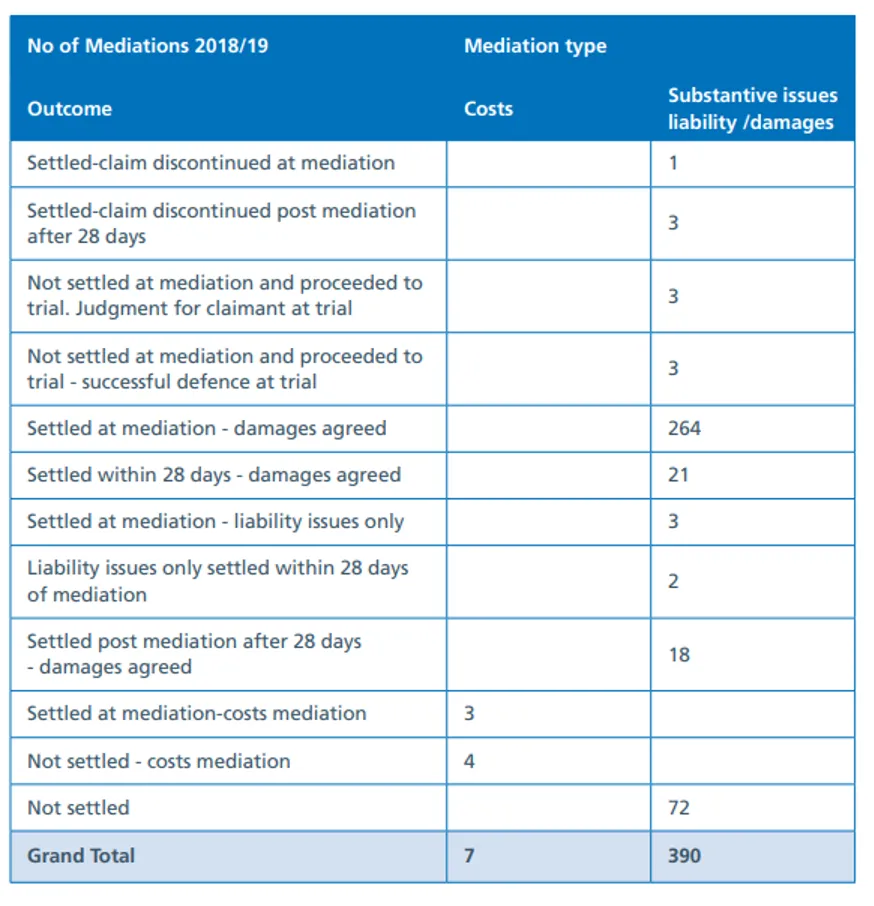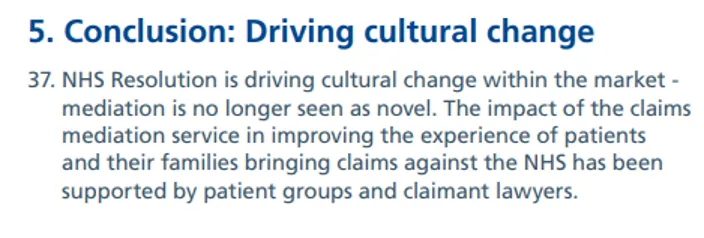by Jonathan Dingle FRSA¹
In December 2016, NHS Resolution (known at the time as the NHS Litigation Authority) took what it describes² as the “ground-breaking step of becoming one of the first indemnifers in the UK to establish a mediation panel with the focus of resolving clinical negligence and personal injurycompensation claims". Historians of dispute resolution may differ on the chronology, there having been a number of important schemes dating from 20 years before, but in terms of a change in mindset for the NHS it was certainly “revolutionary” given the previously stoic defence of the indefensible and the slow adoption of the duty of candour by those instructed on behalf of Trusts.
This change in attitude was followed in 2017, by the name change from NHS Litigation Authority to NHS Resolution and the launching of a five-yearstrategy; as an organisation, under the cogent and inspiring leadership of Helen Vernon³, NHSR determined itself to become more focused than ever before on prevention, learning, and early intervention. There was also what this writer considers to have been a genuine focus on improving the patient’s experience by addressing concerns in ways other than by litigation.
Mediation and alternative dispute resolution (ADR) became fundamentally aligned with NHSR’s strategy to deliver fair and cost effective resolution, by getting to the right answer quickly, safely, and reducing the number of claims going into formal litigation by keeping patients and healthcare professionals out of court. It was broadly recognised as successful. As the country went into lockdown, NHSR published a report reviewing the effectiveness of that commitment.
The purpose of this article is to review that report, and what has happened in the four unprecedented months since that time – and then to gauge the future of NHS Dispute Resolution, at least for patients and staff.
Spoiler alert – it is definitely a case of “we can work it out”.
The context
Mediation is an independent, voluntary and confidential process in which a trained neutral, the mediator, helps the parties to resolve their dispute.Mediation is usually conducted by discussions ‘off the record’ both in meetings with all parties which the mediator will chair and in private and confidential meetings between individual parties and the mediator alone. The mediator does not act like a judge or arbitrator and makes no decision on who is right or wrong, but acts as a facilitator to help the parties reach settlement.
In 2008, the author recorded, in a review for the medico legal textbook Powers & Harris⁴, that as an organisation, NHSR had undertaken a significant number of mediations throughout its 25-year history, often in high profile cases and group actions. More, however, could certainly be done: mediation had gained traction elsewhere in the sector. A trial of the idea was recommended and the then NHSR CEO, Steve Walker, seemed keen.
In July 2014, coinciding with the appointment of Helen Vernon, NHSR launched a pilot to test the effectiveness of mediation and how it could be better deployed as part of the case handler’s “toolkit” for claims resolution. Under the pilot, mediation was offered in a small cohort of cases involving a fatality or elderly care. The pilot ran for 12 months and came to an end on 1 August 2015.
Offers of mediation (which involved only one provider) were made in 91 cases and 49 cases were accepted into the pilot. One case settled before mediation and one case was withdrawn, and there were 47 completed mediations. Of the 47 completed mediations, 81% settled, of these 61% of the settlements were achieved on the day of the mediation and a further 20% a short time thereafter.
The pilot was rightly deemed a success – the more so given the scepticism of some in the professions. Claimant solicitors sometimes feared for their costs and some Defendant panel firms so distrusted claimant solicitors that it seemed that they did not wish to enter discussions before the door of the court. But supported by influential figures at the time, and repeated decisions of the Court of Appeal that encouraged mediation, more sanguine heads prevailed.
Thus, NHSR consulted with the expert providers and launched its Claims Mediation service on 5th December 2016. The service was designed tosupport patients, families and NHS staff in working together towards the resolution of incidents, legal claims and costs disputes and to avoid the need, expense, and potential emotional stress of going to court. The contracts were awarded to the Centre for Effective Dispute Resolution (CEDR) and Trust Mediation Limited⁵ to mediate disputes arising from personal injury and clinical negligence incidents and claims.
Under the service for the mediation of substantive issues of liability and quantum, the mediator’s fees, travel/accommodation expenses and anysupplier costs are paid equally by the parties except in the following cases when the costs will be borne solely by NHS Resolution:
Trust representatives and patients, and their respective lawyers (if any) normally attend mediations, sometimes supported by barristers. The clinicians involved very rarely attend – although a clinical or medical director may do so if appropriate.
It followed that there were substantial benefits for patients and their representatives, and Trusts and their hard-working medical professionals. Unlike court proceedings, the confidential mediations do not provide a public distraction or risk to reputations. Discussions are without prejudice and swift, completing within a day and often (at least in a hundred or so cases the author has mediated) in around four hours.
Costs Alternative Dispute Resolution (CADR)⁶ was appointed to mediate disputes arising from the recoverability of legal costs. This scheme isoutside the scope of the article but has been less popular with practitioners. There is a vibrant legal costs industry that has, for many reasons, some of them self-interest, been slow to adopt mediation despite the best efforts of its Association⁷ and many leading figures.
Case volumes
Since the inception of NHSR’s Claims Mediation service, from December 2016 to 31 March 2019, 606 completed mediations took place. In 2017/18, NHS Resolution set a target to mediate at least 50 cases and this was exceeded threefold by the completion of 189 mediations. The identified trend year on year has been a significant increase in the overall number of mediations.
There was a 110% increase in the use of mediation, up from 189 cases in 2017/18 to 397 cases in 2018/19. NHS Resolution mediated more cases than ever before in its entire history. Mostly the cases were alleged medical negligence – although there were a small number of personal injury matters and still fewer costs cases:

In 2019/2020 it is believed that the number of cases referred to mediation was nearer 800⁸ and represented approaching 10% of the claims notified to NHSR. This trend appears to be continuing despite COVID-19. The vast majority of these were alleged clinical negligence matters.
Mediation outcomes
The following chart sets out the mediation outcomes for all of the 397 cases mediated in 2018/19 and is a useful analysis. The highlighted narrative explains the outcomes of cases settled on the day of the mediation or within 28 days of the mediation date.
Importantly – and a tribute to the success of the process – only six cases (around 2%) taken to mediation subsequently proceeded to trials. In those six cases, the claimants were successful on three occasions, with the trusts also successful in defending three claims at trial.

This ability to settle cases, and to do so effectively, provided a high level of satisfaction with the process to both lay participants and the professionals. Certainty of outcome, the ending of litigation, and the chance to receive a personal face to face apology were highly regarded. So too were the (rarer but important) options to have detailed explanations or a discussion with a Trust manager.
It genuinely transpires that for a great many people, it is not all about the money – for many, the process is a package where money will only be a factor in moving on with their lives. In more serious cases, money is, however, important to facilitate that recovery.
Mediation is offered for all types of claims across the value spectrum. The graph below provided by NHSR captures the value of the claim (excludingcosts) at the date of the mediation, reflecting that in 2018/19, the majority of claims mediated fell within the damages tranche £50,001 - £250,000.
That said – there were still a substantial – almost a quarter – of claims mediated where the damages agreed were close to or above £1,000,000.
Workplace mediation and resolving staff differences
Mediation is not only about clinical negligence and personal injury. Increasingly it has been adopted in-house and is available to provide options to resolve – ideally at an early stage – those disputes that grow in departments, in teams, or between individuals. Workplace mediation, by clinicianstrained as mediators, is new to the NHS in the last five years but offers real benefits.
One scheme, in a leading teaching Trust on the South Coast, has been pioneered by clinical leads and has proved a success in improving morale and relationships between staff. The ability for a neutral to listen and help build solutions, often over a series of mediation meetings that are confidential, has proved to be an excellent asset.
Those pioneers are involved in training other Trusts and mediators. It is a strong sign of the times.
The impact of COVID-19
The times though are difficult – but the pandemic has not brought an end to mediations. On the contrary, the two providers have shifted to remotemediations using Zoom-pro, Teams, Skype, and (in the author’s case at least) FaceTime and the good old fashioned telephone. The national figures are not yet available but anecdotally, and in the author’s experience, the volume of mediations has remained broadly constant albeit that the outcomes have been fewer settlements on the day.
Looking at this, it appears that people need more time when not in the same physical space as their legal advisers, or their clients, or their Trusts, to obtain instructions and to reflect. Whilst the process works well up to a point, it is right that nothing replaces personal contact, conversation, and body language as a means of timing what is best to say to effect good discussions.
Mediation has, however, adapted and mediators are now being taught remote mediation skills. They are learning to take more time, to build rapport online, and to handle the tech with greater fluency. The process is there to be adapted and can be made to work well – though most people are looking to return to face-to-face mediation as soon as it is safe.
The future⁹
In terms of clinical negligence – it is not just NHS Trusts using the scheme. GPs have moved on the NHSR scheme now, and are being embraced.Two medical indemnity providers have also adopted mediation. It is undoubtedly the future. The NHSR itself concludes:

Mediation has moved mainstream and is no longer novel. It is a day trip to resolution where we can work it out. The Beatles had it both ways – and so do patients, the NHS, and its staff. Let it be.
References
[1] The author is a leading barrister and mediator at Normanton Chambers, who has also been an integral part of SpecialistInfo’s medico-legal faculty since it began. He helped found the NHS Resolution mediation scheme and has been at the heart of mediation in this country since 1996. He is chair of Trustees of the national mediation charity The Society of Mediators and an international mediation trainer. He writes in a personal capacity.
[2] https://resolution.nhs.uk/wp-content/uploads/2020/02/NHS-Resolution-Mediation-in-healthcare-claims-an-evaluation.pdf .
[3] https://resolution.nhs.uk/leadership/helen-vernon/
[5] https://www.trustmediation.org.uk/nhs-resolution/
[6] http://www.costs-adr.com/nhs-resolution-mediation-service
[7] https://www.associationofcostslawyers.co.uk/Services
[8] NHSR will confirm the figure in its annual report expected late July 2020 after this article was written
[9] Specialist Info offers monthly courses for medical
professionals to train as mediators with a view to working in the NHS, or elsewhere, whether to provide clinical negligence mediation, workplace mediation or to facilitate difficult conversations in a range of situations. If you are interested in training as an Accredited Mediator through SpecialistInfo – please see https://www.specialistinfo.com/a_ml_mediation.php
Lorem ipsum dolor sit amet, consectetur adipiscing elit, sed do eiusmod tempor incididunt ut labore et dolore magna aliqua. Ut enim ad minim veniam, quis nostrud exercitation ullamco laboris nisi ut aliquip ex ea commodo consequat. Duis aute irure dolor in reprehenderit in voluptate velit esse cillum dolore eu fugiat nulla pariatur.
Block quote
Ordered list
Unordered list
Bold text
Emphasis
Superscript
Subscript